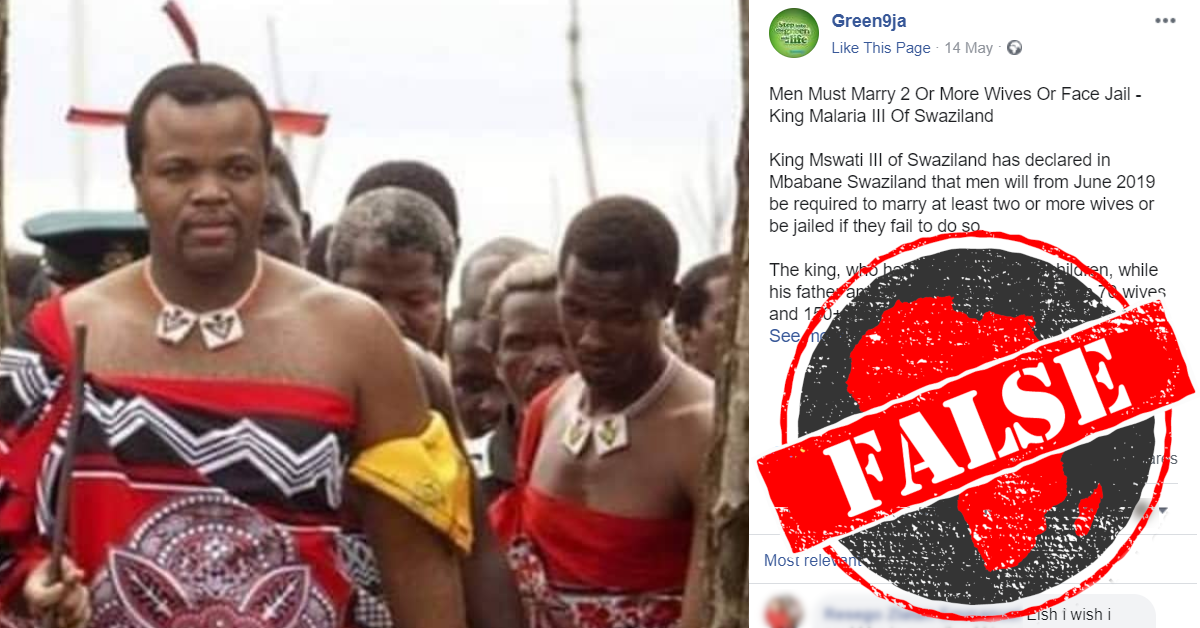In December 2018, Africa Check debunked a false news report that the southern African country of eSwatini had passed a law allowing its king, Mswati III, to marry 14-year-old virgins.
Now a Facebook post published in May 2019 claims Mswati has declared that the men of his country must “marry at least two or more wives or be jailed”.
The post reads: “King Mswati called for all men in the country to marry at least five wives and the government assured the men that it would pay for the marriage ceremonies and buy houses for them. King Mswati warned that any man or woman who opposes the decision will face a life sentence.”
Early in the post, Mswati is wrongly referred to as “King Malaria III”.
The claim has been shared on other Facebook pages and the sites Global Trending News and Gossip.

But the eSwatini government quickly denied the report, in a statement published in the country’s Swazi Observer.
“The current dispatch titled ‘Marry more wives or face jail’ quoting the King, and all other related reports, are not only an insult to the Monarchy and the culture of Eswatini but a disgrace to journalism,” said government spokesperson Percy Simelane.
“His Majesty has not made any pronouncement to that effect as it has never been an issue raised by Emaswati. We will continue to appeal for morality, responsible behaviour and professionalism among journalists and the general public with access to social media.”
Global fact-checking site AFP Fact Check traced the original false story to the Zambian Observer. The newspaper later took the story down and replaced it with a report on the eSwatini government’s denial.
In May Africa Check debunked another false Zambian Observer story. This one told a tale of a Zambian midwife admitting to switching 5,000 babies at birth over the course of 12 years. – Africa Check
Now a Facebook post published in May 2019 claims Mswati has declared that the men of his country must “marry at least two or more wives or be jailed”.
The post reads: “King Mswati called for all men in the country to marry at least five wives and the government assured the men that it would pay for the marriage ceremonies and buy houses for them. King Mswati warned that any man or woman who opposes the decision will face a life sentence.”
Early in the post, Mswati is wrongly referred to as “King Malaria III”.
The claim has been shared on other Facebook pages and the sites Global Trending News and Gossip.

‘Disgrace to journalism’
But the eSwatini government quickly denied the report, in a statement published in the country’s Swazi Observer.
“The current dispatch titled ‘Marry more wives or face jail’ quoting the King, and all other related reports, are not only an insult to the Monarchy and the culture of Eswatini but a disgrace to journalism,” said government spokesperson Percy Simelane.
“His Majesty has not made any pronouncement to that effect as it has never been an issue raised by Emaswati. We will continue to appeal for morality, responsible behaviour and professionalism among journalists and the general public with access to social media.”
Global fact-checking site AFP Fact Check traced the original false story to the Zambian Observer. The newspaper later took the story down and replaced it with a report on the eSwatini government’s denial.
In May Africa Check debunked another false Zambian Observer story. This one told a tale of a Zambian midwife admitting to switching 5,000 babies at birth over the course of 12 years. – Africa Check
Republish our content for free
For publishers: what to do if your post is rated false
A fact-checker has rated your Facebook or Instagram post as “false”, “altered”, “partly false” or “missing context”. This could have serious consequences. What do you do?
Click on our guide for the steps you should follow.
Publishers guideAfrica Check teams up with Facebook
Africa Check is a partner in Meta's third-party fact-checking programme to help stop the spread of false information on social media.
The content we rate as “false” will be downgraded on Facebook and Instagram. This means fewer people will see it.
You can also help identify false information on Facebook. This guide explains how.


Add new comment